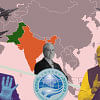A call for restraint

We are deeply concerned by the escalating tensions between India and Pakistan, as both countries exchanged fire across the Line of Control in disputed Kashmir, following the recent terrorist attack in Kashmir's Pahalgam that resulted in the deaths of 26 tourists. As the Indian government has accused its long-standing adversary, Pakistan, of supporting "cross-border terrorism," relations between the two countries have plunged to their lowest level in years. Denying any involvement, Pakistan called the Indian attempts to link Pakistan to the Pahalgam attack "frivolous" and vowed to respond to any Indian action. Both nations have since introduced a series of retaliatory measures against each other. While we strongly condemn this heinous attack in Kashmir—the worst of its kind in a quarter of a century—and expect those responsible to be brought to justice, we also urge both countries to refrain from actions that could escalate the situation.
Reportedly, India has taken some strong measures following the attack. It has formally informed Pakistan of its decision to suspend the Indus Waters Treaty of 1961, closed the main land border crossing, downgraded diplomatic ties, and revoked visas for Pakistanis. Indian Home Minister Amit Shah also urged state chief ministers to ensure that no Pakistani remains in India beyond April 27. In response, Pakistan has closed its airspace to Indian airlines, expelled Indian diplomats and military advisers, cancelled visas for Indian nationals (except Sikh pilgrims), and shut down its side of the main border crossing.
It goes without saying that any further escalation will have far-reaching consequences for both nations. And it will be particularly disastrous for the economy of Kashmir, which is heavily dependent on tourism.
The UN has emphasised that issues between the two nations should be resolved peacefully through meaningful mutual engagement, a view we strongly support. A proper and thorough investigation is essential to identify and punish those involved in the recent terrorist attacks. However, even before such an investigation is carried out statements from India's water resources minister, pledging that "not even a drop" of water would go to Pakistan, and Pakistan's warning that halting the water supply from the Indus River would be an "act of war," are deeply concerning.
We hope both these nuclear-armed nations will renounce retaliatory actions and resolve their disputes at the negotiating table. With Pakistan reportedly proposing an international investigation and expressing willingness to cooperate, India should consider such an initiative. Finally, we urge both nations to avoid actions that could destabilise the entire region and instead focus on diplomatic solutions for the greater benefit of both sides.


 For all latest news, follow The Daily Star's Google News channel.
For all latest news, follow The Daily Star's Google News channel. 






Comments